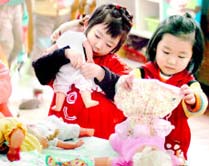
China needs to further integrate its efforts to promote the development of children under the age of 3, according to a United Nations Children's Fund (UNICEF) consultant.
"We should not divide children into pieces," New York-based Judith Evans said Tuesday.
"Early childhood development is not simply nutrition or immunization, it is a holistic (form of development).
"The efforts by the families and communities should be integrated to support the children's early development."
Evans is in Beijing for a four-day training workshop on integrated early childhood development, which started Tuesday.
She is the principal trainer, assisting participants from China, the Democratic People's Republic of Korea, Laos, the Philippines, East Timor and Viet Nam.
"Integrated early childhood development plays a key role in ensuring the best start for children, and healthy growth and the full development of their minds and bodies so that they can become the pillars of national development," said Wang Xinggen, deputy director-general of the Ministry of Commerce's Department of International Trade and Economic Affairs. The ministry is the chief coordinator for cooperation between China and the UN.
The Chinese Government created a new national early childhood development policy last year with UNICEF's support.
It underscores the need for coordinated efforts between the health and education sectors to provide services for children, especially those younger than 3, in a holistic and integrated manner.
A second policy, on comprehensive child nutrition, is being developed.
Hailing the national policy, UNICEF Program Officer Anjana Mangalagiri said the government now has to allocate funding so it can be fully implemented.
Zhang Qiuling, a lecturer with Beijing Normal University, said more institutions should be set up to help take care of small children.
Presently in China, most children aged under 3 are cared for by their grandparents or nurses because their parents are too busy working, Zhang said.
"Sending children to community-based institutions will increase their chances of communicating with others and getting more integrated care," she says.
Experts agree that children who have received quality health and nutritional care, and appropriate mental stimulation before their third birthday have better cognitive and social skills, as well as an enhanced capacity for learning.
They are also an average of eight IQ points ahead of other children by the time they are ready to start school and they are also more likely to continue with their schooling, said Cliff Meyers, a regional adviser for education at UNICEF's East Asia and Pacific Regional Office.
(China Daily June 30, 2004)
|

